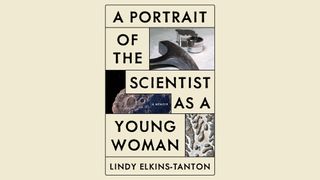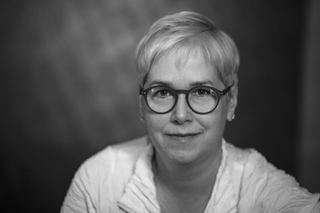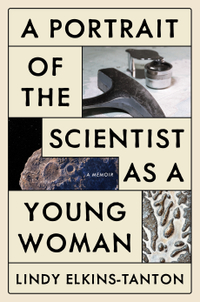In 'A Portrait of the Scientist as a Young Woman,' a personal story of coming to planetary science

For a planetary scientist, Lindy Elkins-Tanton of Arizona State University has what is perhaps a particularly eclectic resume.
She has worked in business, raised sheep and border collies, and taught math, among other jobs. Today, she's the principal investigator of NASA's Psyche mission, a spacecraft designed to explore the asteroid of the same name, which appears to be primarily made of metal. She tells the story of all of these experiences and much more in her new memoir, "A Portrait of the Scientist as a Young Woman," (William Morrow, 2022).
Space.com sat down with Elkins-Tanton to discuss her new book, how she came to planetary science, why she fights harassment in academia, and more. This interview has been edited for length and clarity.
Related: Best space and sci-fi books for 2021
<a href="https://target.georiot.com/Proxy.ashx?tsid=72128&GR_URL=https%3A%2F%2Famazon.com%2FPortrait-Scientist-Young-Woman%2Fdp%2F0063086905%3Ftag%3Dhawk-future-20%26ascsubtag%3Dhawk-custom-tracking-20" data-link-merchant="Amazon US"" target="_blank" rel="nofollow">A Portrait of the Scientist as a Young Woman
William Morrow, 2022 | $25.99 on Amazon
In a compelling new memoir, planetary scientist Lindy Elkins-Tanton traces the winding path that led her to lead a NASA mission.
Space.com: How did the book come about for you?
Lindy Elkins-Tanton: I was contemplating writing a book about the history of exploration. I'm very interested in the roles of wealth and gender and society and nationality in the history of exploration. I started talking to an agent about it, and she said, "You know, that's interesting, but your story is way more interesting." So we started talking about a different book, and I was so excited that anybody would be interested.
Space.com: How did you decide to make it so personal?
Get the Space.com Newsletter
Breaking space news, the latest updates on rocket launches, skywatching events and more!
Elkins-Tanton: To me, that human experience is just the more interesting and useful part. You can read facts about science and things like that lots of places. But when I'm reading — even a book that's mostly about science or mostly about exploration or mostly about space — I really want to know what the person is doing, what they were thinking, how they got there, why they made the choices that they did. I feel like that's what makes it really pertinent and interesting.
And to me, that's the part of my story that may be unusual and interesting to others that I didn't have some kind of straight shot, I didn't know where I was going from the beginning. In high school, I really thought, "Do I want to pursue music? Or is it really science that I'm interested in?" And then when it was science, I was really thinking I wanted to do animal behavior. I ended up in geology, which is also a thing that I really love, but then my curiosity about the world was stronger than my confidence in myself as a scientist. And so I was very curious to learn about business and that's when, after my undergrad, I went and worked in business for a number of years. And it was so interesting to see the many ways that people organize teams and try to get things done and what motivates people and it was very different than academia.
Space.com: You mentioned your roundabout path — how has that lived experience informed the work you do?
Elkins-Tanton: When I went back to academia for grad school, I had some people say to me, things like, "It's too bad that you spent all this time doing business, but now you're back on track." There was this feeling that it was late and I'd done myself a disservice.
I had people say, "Wasn't it awful working in business where everyone's so cutthroat?" And I would say that's not so much my experience actually. A high-powered academic place can be more cutthroat than anywhere else that I know.

I saw the power of having a common goal, which in business is often the bottom line, sell the product, whatever it is. But having a bottom line does unite people and that's something that has been so motivating to me in the larger projects that I've put together. And of course, the biggest of them all is the Psyche mission. Everyone on the team wants to build this robot to go to space and find out what this asteroid is that no humans have ever looked at before. And that motivating commonality pulls the whole team together. I feel like it's those moments when humans are at their best. So that's one of the things that I really brought with me from the business world: That having a world where each person is really out for themselves, the way it is in some parts of academia, is not actually the best way to make either progress or a nice workplace.
Space.com: There's a chapter where you write about several years of fieldwork you conducted in Siberia looking for geologic signs of what caused the massive end-Permian extinction. What was it like to look back on that fieldwork?
Elkins-Tanton: Going back and thinking about all that Siberia work was so much fun. I think in retrospect, it even seems more exotic and more fantastical than it did at the time. It was really almost the sweetest kind of revisiting. It's not that far in the past — I just published another paper about all that stuff just last year — but 2006 is a little while ago now and revisiting what it smells like to be there and how things tasted, the food that we ate and the ways that we got transported around and just seeing Russia on the inside and thinking about that in today's context — all of it was so much fun to revisit for me.
Space.com: Throughout the book, you write about dealing with harassment in academia. Why was it important to you to include those experiences?
Elkins-Tanton: The things that I really wanted to write about, I found, were the things that were very emotionally resonant to me. Either they had been difficult or surprising or they'd led me to some little realization about people. Those were the parts of the story that felt to me like they were just itching to get out onto the page.
Learning about how organizations and teams make themselves function better and be safer for more people has been a crazy learning experience. One of the things I've really learned about it is something that might seem completely obvious: Not everyone cares about that stuff. People who do not feel endangered or don't empathize with those who are harassed or bullied, those few people who've never been harassed or bullied, may not feel super motivated to take care of that kind of team culture problem.
The other thing I've learned is that to make change in human organizations is slow. I think in this case, in particular, you need both ends of the hierarchy to be working toward a common goal. You need the rank and file, so to speak, all of us doing the day-to-day work, to be willing to report and to be willing to press for a better culture, to hold leadership accountable. That's scary and hard to do.
And then on the other hand, the leadership has to be determined to make an ethically correct, well-functioning organization. It's so much easier a lot of times for leaders to find a way to pass somebody by and not censure them, not reprimand them, not fire them when they have misbehaved, because often those are the people who have power and have benefit to the organizations. The leaders have to be determined that creating a situation where people don't get harassed and don't get bullied is more important. It's almost like you need a little perfect storm of many elements to get an organization to really work on it.
Space.com: You mentioned earlier that you had been thinking about writing a book on the history of exploration. How do you think about the idea of exploration?
Elkins-Tanton: I wonder if we take a little bit for granted, especially those of us who are interested in space exploration, that we are able to do so much exploration of our solar system purely in the service of science and the knowledge that we accrue to humankind this way.
When you look backward in time, science was never the motivator for big exploration. Science came as a ridealong, right? Charles Darwin was the gentleman companion to the captain of the ship who was going out to do surveying and create a better economic environment for England. It had nothing to do with discovering evolution or any kind of science, that's what Darwin basically did in his spare time.
There are so many examples where exploration was really all about nationalism, or heroism, or most importantly about commerce and business. And now we live in this amazing world where we can actually do exploration just in the service of learning more.
As a kid, I was so taken with stories of exploration: The first Europeans to go to Africa, what animals do they find, this kind of thing. I just ate those books up, I still have them, the same copies of the books that I read.
It wasn't until I got to college that I realized that women basically were never invited to do that work. Having a world now where it's a little more possible for women to lead explorations is pretty amazing. And of course, it's not just women, it's where are you in the socioeconomic ladder, what is the color of your skin compared to other people around you, all those things that can hold people back.
But exploration's history of exclusion doesn't mean that the rest of us don't want to go learn and discover and explore. There's this sort of shiny world that we imagine ourselves in that's a little more complicated once you scratch the surface.
Space.com: What do you hope people get out of the book?
Elkins-Tanton: The thing that I'm really hoping is that there'll be some human connection for everybody, that we will all have had some common experience, and so it'll almost feel like meeting a person and knowing them a little bit. I would really love that. And also maybe there is an aspect of encouragement for people who are coming along in their careers that you don't have to know all the answers from the beginning and that you can trust yourself. Where your joy takes you is a good place.
Space.com: Is there anything else about the book you'd like to share?
Elkins-Tanton: One thing that I wasn't even super clear about myself when I started writing the book, and then it became really obvious to me, was that when I was in my late 20s, I was really in a mess. I had lots of anxiety and depression and all these nightmares and I was a single mom, and I had different kinds of things going on that I needed to work on. At that moment, I don't think there was much about me that said I was going to be effective or make a path of any variety.
And so I think it's good for me, at least, to remember that sometimes people don't shine as brightly as they might and that with some support and encouragement, amazing things can happen. Maybe the lesson is always look past that first impression you have of a person and see what else they have to offer.
You can buy "A Portrait of the Scientist as a Young Woman" on Amazon or Bookshop.org.
Email Meghan Bartels at mbartels@space.com or follow her on Twitter @meghanbartels. Follow us on Twitter @Spacedotcom and on Facebook.
Join our Space Forums to keep talking space on the latest missions, night sky and more! And if you have a news tip, correction or comment, let us know at: community@space.com.

Meghan is a senior writer at Space.com and has more than five years' experience as a science journalist based in New York City. She joined Space.com in July 2018, with previous writing published in outlets including Newsweek and Audubon. Meghan earned an MA in science journalism from New York University and a BA in classics from Georgetown University, and in her free time she enjoys reading and visiting museums. Follow her on Twitter at @meghanbartels.

